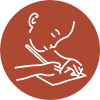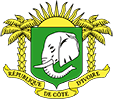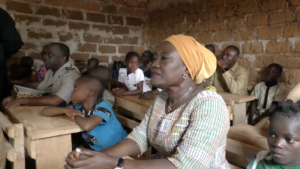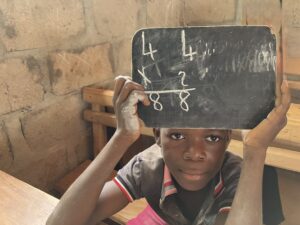The scene is lively and vibrant—unusual for a Saturday morning—in the Madou Sahoua public elementary school in the town of Mayo, in the Nawa region of western Côte d’Ivoire. Voices and songs echo through the courtyard, where motorcycles are parked in large numbers. The classroom, which is full of grade 6 pupils during the week, is now overflowing with teachers who have come from several elementary schools in the surrounding area to be trained in the new Programme National d’Appui aux Premiers Apprentissages Scolaires (PNAPAS, National Early Learning Support Program).
Faced with a persistent learning crisis, Côte d’Ivoire took the initiative of launching this program, with over 7,000 public elementary school teachers involved in this first phase of training. The PNAPAS program is supported by CLEF partners, including the Government of Côte d’Ivoire, philanthropic foundations, and cocoa and chocolate industry corporations.
PNAPAS aims to introduce proven teaching approaches to help learners enhance their reading and arithmetic skills. This program addresses a worrisome reality: in low- and middle-income countries, seven out of ten children aged 10 have trouble reading and comprehending simple text. In Sub-Saharan Africa, this disturbing figure is nine out of ten children. Côte d’Ivoire is acutely aware of the risks of school dropout and child labor linked with this situation and is determined to address it.
At the heart of this educational reform, teachers are becoming acquainted with methods that put the student at the center of the learning process. Mr. Aly Ouattara, pedagogical advisor and trainer, is providing guidance to the teachers as they apply the concepts they have learned. Mr. Ouattara is enthusiastic: “As a pedagogical advisor and trainer, I’m thrilled to be supporting my colleagues through this process of transformation. With PNAPAS, we are embarking on two critical components: first, structured pedagogy for the introduction of basic reading and mathematical skills in the first three years of primary school, and second, the implementation of remedial strategies to support children facing difficulty throughout their school career.”
Teachers from Liliyo and other surrounding villages, also in the Nawa region, meet at the local youth center to learn about new teaching methods. The teachers sit on mats on the floor, simulating remedial strategies such as learning through play. Ms. Ange Raphaëlle Bangoua, one of the teacher trainees, emphasizes the importance of the new methods, stating that “remediation techniques allow teaching to be targeted to the individual needs of the learner”.
Faustin Koffi, General Inspector of National Education, is actively monitoring PNAPAS implementation in Soubré, Nawa’s regional capital. “We created this innovative program,” explains Mr. Koffi, “by taking methodologies that have proven to effectively improve learning elsewhere, and adapting them to our context, particularly the structured pedagogy in Kenya, Liberia, and South Africa, and Teaching at the Right Level‘s remediation techniques in India and Zambia.” Aware of the challenges ahead, he underlines the importance of ongoing mentoring to ensure that the new pedagogical approaches are effectively adopted in the classroom. With this in mind, “communities of practice” will be established to enable teachers to exchange their experience and share best practice.
Before the start of the new school year in September, more than 10,000 additional teachers will be trained with CLEF support in the Haut-Sassandra and Guémon regions, while training will be extended to other regions of the country with the support of the World Bank.
CLEF is a commitment to:
- get more children into school.
- make sure children learn at school.
- Achieve impact at scale; we want to make a difference in the lives of more than 4 million children by 2027.
CLEF funds school infrastructure and childcare facilities, supports teacher training in evidence-based pedagogical techniques, promotes behavior change so parents engage in their children’s education and apply good parenting practices to boost early childhood development, and tests a cutting-edge school nutrition program.
CLEF welcomes new partners: contact us to learn more about the initiative and to get involved.



